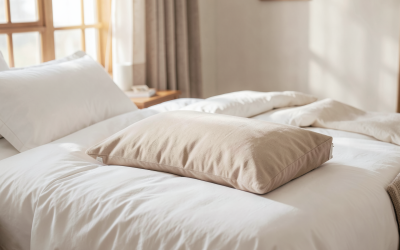Getting enough sleep is essential for maintaining good health and wellbeing. But the quality of that sleep is just as important. That’s why understanding the healthiest way to sleep can give you an edge in your overall wellbeing. The following focuses on tips for getting the best sleep possible.
Benefits of Healthy Sleeping Habits
Good sleeping habits can benefit your body and mind in many ways. Healthy habits can provide you with more energy, better concentration, improved mood, better physical health, and reduced stress and anxiety. Regular exercise, eating a balanced diet, and indulging in calming activities before bedtime can all help encourage healthy sleeping habits.
Getting enough sleep is essential for your overall health and wellbeing. It can help improve your memory, boost your immune system, and reduce the risk of developing certain chronic illnesses. Additionally, getting enough sleep can help you maintain a healthy weight, as it helps regulate hormones that control appetite. Finally, getting enough sleep can help you stay alert and focused throughout the day, allowing you to be more productive and efficient.
Tips for Improving Your Sleep Quality
Creating a bedtime routine is a great way to optimize your sleep quality. Setting a consistent sleep schedule, where you go to bed and wake up at around the same time each day, helps maintain circadian rhythm, giving your body clocks the cue to rest and reset. Getting rid of distractions, such as phones and tablets, which emit blue light, will also help limit distractions, allowing you to drift off faster.
In addition to creating a bedtime routine, it is important to create a comfortable sleep environment. This means making sure your bedroom is dark, quiet, and at a comfortable temperature. Investing in a quality mattress and pillow can also help improve your sleep quality. Finally, avoiding caffeine and alcohol before bed can help you fall asleep faster and stay asleep longer.
Sleep Positions and Their Effects on Health
Different sleep positions can affect your health in different ways. It’s important to understand how the position of your body at night can influence your sleep quality and overall wellbeing. For example, sleeping on your back can cause problems with snoring and acid reflux, while sleeping on your side can reduce acid reflux symptoms, provide better breathing, and help keep the spine in alignment. It’s recommended to sleep on your side if possible to optimize your sleep quality.
The Role of Mattress and Pillow Comfort
It’s important to get adequate support for your body while you’re asleep. That’s where mattresses and pillows come in. A good mattress should be able to keep your spine in alignment and provide cushioning to relieve pressure points so that your muscles can relax. Higher-end mattresses can provide air channels and heat reduction technology that helps keep you at a comfortable temperature. Pillows should offer adequate support for the neck and head while you sleep, and adjustable pillows are a great option for those who are constantly transitioning between sleep positions.
Effects of Sleep Deprivation on Health
Sleep deprivation is a serious threat to both physical and mental wellbeing. It can lead to lowered immunity, an increased risk of obesity, diabetes and heart disease, as well as impaired cognitive performance. Prolonged insufficient sleep has also been linked to higher levels of depression and anxiety in both adults and children. To avoid these issues, it’s important to prioritize getting enough sleep every night so your body and mind have the chance to rest and reset.
Creating a Healthy Sleep Environment
Making sure your bedroom is designed with sleep in mind can have a significant impact on how you rest. This means ensuring the room has enough natural light, keeping the temperature comfortable with air conditioning or heating if needed, reducing noise, investing in blackout curtains to reduce light pollution in winter months, and eliminating distractions such as electronics or clutter.
Natural Remedies to Improve Sleep Quality
Using natural remedies for sleep has a number of potential benefits without the side effects of prescription medications or over-the-counter drugs. Examples of these remedies include essential oils like lavender and chamomile, herbal teas such as valerian root or passionflower tea, melatonin supplements, calming activities like yoga or meditation, and acupressure techniques.
The Benefits of Napping
Napping is another way to get some rest during the day. Studies have shown that taking short power naps can boost alertness and concentration, as well as improve mood and memory. Naps should generally be kept to 20 minutes or less to avoid feeling groggy afterwards. Nonetheless, regular naps throughout the day can help ensure your body gets enough rest.
Common Sleep Disorders and How to Treat Them
Sleep disorders such as insomnia, apnea, menstrual-related insomnia, or narcolepsy can all make it difficult to get quality rest at night or take regular naps during the day. If you suffer from any of these conditions it’s important to find ways to treat them so you can get adequate rest. Speak to a doctor about different options like cognitive-behavioral therapy or prescription medications.



